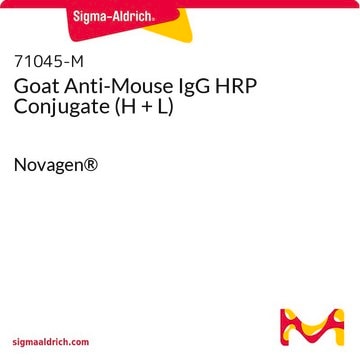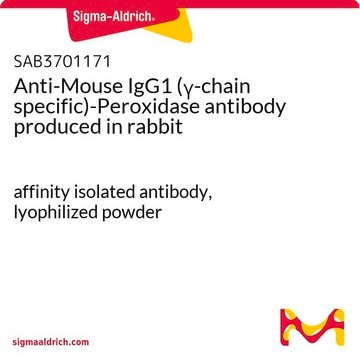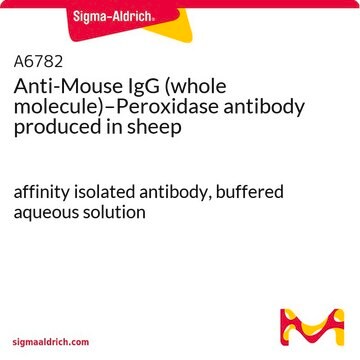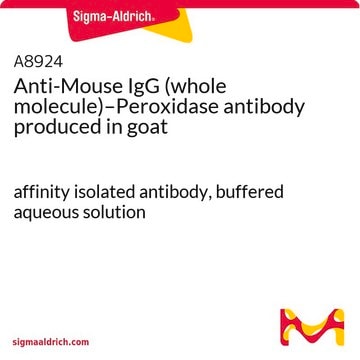A3682
Anti-Mouse IgG (Fab specific)–Peroxidase antibody produced in goat
affinity isolated antibody, buffered aqueous solution
Synonym(s):
Goat Anti-Mouse IgG (Fab specific)- HRP
About This Item
Recommended Products
biological source
goat
Quality Level
conjugate
peroxidase conjugate
antibody form
affinity isolated antibody
antibody product type
secondary antibodies
clone
polyclonal
form
buffered aqueous solution
species reactivity
mouse
should not react with
human, rat
technique(s)
direct ELISA: 1:40,000
immunohistochemistry (formalin-fixed, paraffin-embedded sections): 1:150
western blot: 1:80,000-160,000 using detecting β-actin in total cell extract of HeLa cells (5-10 μg per lane)
shipped in
dry ice
storage temp.
−20°C
target post-translational modification
unmodified
Looking for similar products? Visit Product Comparison Guide
General description
Goat anti-mouse IgG (Fab specific)-peroxidase antibody is specific for mouse IgG and the Fab fragment of mouse IgG. The antibody reacts with all mouse IgG subclasses (G1, G2a, G2b and G3) and also with mouse IgA, IgM and IgE. Moreover, the antibody conjugate shows no reactivity with the Fc fragment of mouse IgG or with human and rat IgG.
Immunogen
Application
- enzyme-linked immunosorbent assay (ELISA)
- immunohistochemical studies
- dot or immunoblotting
Biochem/physiol Actions
Physical form
Preparation Note
Disclaimer
Not finding the right product?
Try our Product Selector Tool.
Signal Word
Warning
Hazard Statements
Precautionary Statements
Hazard Classifications
Skin Sens. 1
Storage Class Code
12 - Non Combustible Liquids
WGK
WGK 2
Flash Point(F)
Not applicable
Flash Point(C)
Not applicable
Certificates of Analysis (COA)
Search for Certificates of Analysis (COA) by entering the products Lot/Batch Number. Lot and Batch Numbers can be found on a product’s label following the words ‘Lot’ or ‘Batch’.
Already Own This Product?
Find documentation for the products that you have recently purchased in the Document Library.
Customers Also Viewed
Our team of scientists has experience in all areas of research including Life Science, Material Science, Chemical Synthesis, Chromatography, Analytical and many others.
Contact Technical Service


















